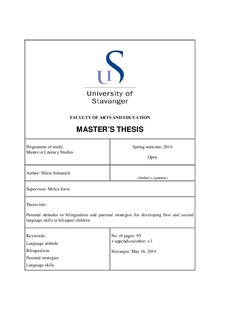| dc.description.abstract | A number of studies have been carried out on parental attitudes to bilingualism and parental strategies for developing bilingual children’s language skills in the mother tongue and the second language. However, few studies have focused on both parental attitudes and strategies for all language skills, including reading, listening, speaking, and writing. This thesis intended to investigate parental attitudes to bilingualism and parental strategies for developing first and second language skills in bilingual children. The participants under study were families who had bilingual children and were living and attending elementary schools in the Stavanger area of Norway. A qualitative approach for data collection was used in order to achieve the objectives of the present study. Among qualitative data collection methods, a semi-structured interview was used. The interviewees were ten parents who volunteered to take part in this study. This study would guide parents who are raising bilingual children and are living in a country other than their own country on the kinds of strategies they could use for different language skills in the home.
The main findings of the study were that all the interviewees, especially mothers, were very much involved in reading comprehension and writing with their children, and motivated their children by buying or borrowing books. As for the speaking skill, all families had dinner-time discussions, which were favored among other speaking activities. In addition, the interviewees asserted that their children liked listening to songs and stories parents sang and read. The interviewees strongly believed that they should use their mother tongue in the home in order to teach and maintain it in addition to Norwegian. All parents used similar error-correction strategies for productive skills. Moreover, there was no distinction between fathers’ and mothers’ error correction techniques. Parental attitudes to bilingualism were another aspect of focus in the present study. The results of the study indicated that all the interviewees had positive attitudes to bilingualism. They believed that bilingualism would assist the educational progress of their children. Moreover, the interviewees believed that bilingualism had a positive effect on the educational progress of their children, although not all parents put effort to keep the mother tongue and Norwegian simultaneously regarding the four language skills. In the following chapters, all the aforementioned findings and discussions about parental strategies for the language skills in the home and their attitudes to bilingualism will be presented in detail. | nb_NO |
